| Listing 1 - 10 of 13 | << page >> |
Sort by
|
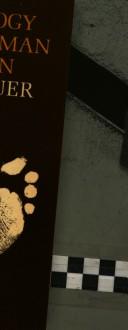
ISBN: 0521287782 0521245443 Year: 1982 Publisher: Cambridge : Cambridge university press,
Abstract | Keywords | Export | Availability | Bookmark
 Loading...
Loading...Choose an application
- Reference Manager
- EndNote
- RefWorks (Direct export to RefWorks)
Human beings --- Social evolution. --- Sociobiology. --- Animal nature.
Book
ISBN: 1474434959 1474422756 1474422764 9781474422758 9781474422734 147442273X 9781474422741 1474422748 9781474422765 Year: 2017 Publisher: Edinburgh
Abstract | Keywords | Export | Availability | Bookmark
 Loading...
Loading...Choose an application
- Reference Manager
- EndNote
- RefWorks (Direct export to RefWorks)
These 16 essays apply Deleuze's work to analysing television, film, music, art, drunkenness, mourning, virtual technology, protest, activism, animal rights and abolition. Each chapter questions the premise of the animal and critiques the centrality of the human.
Animals (Philosophy) --- Human beings --- Animal nature of human beings --- Philosophical anthropology --- Philosophy --- Animal nature. --- Deleuze, Gilles, --- Deleuze, G. --- Delëz, Zhilʹ, --- Dūlūz, Jīl, --- دولوز، جيل --- Delezi, Jier, --- Animal nature --- Human beings - Animal nature --- Deleuze, Gilles, - 1925-1995
Book
ISBN: 1474412467 0748680985 9780748680986 9780748680993 0748680993 9780748680979 0748680977 1474474551 Year: 2015 Publisher: Edinburgh. [Scotland] : Edinburgh University Press,
Abstract | Keywords | Export | Availability | Bookmark
 Loading...
Loading...Choose an application
- Reference Manager
- EndNote
- RefWorks (Direct export to RefWorks)
What is man? This book examines Derrida's contribution to this long-standing philosophical and political debate, which has typically evoked a significant division between human beings and other animals. Derrida pays close attention to how animals are used to explore humanity in a range of writings, including fables and fiction. This leads to ethical questions about how humans treat animals: sacrificing animals (say, in factory farms) while extending love to pets. And it leads to political questions about how we dehumanise 'outsiders', from historical matters such as colonialism and slavery to contemporary issues such as state terror in response to 'rogue states'.
Animals (Philosophy) --- Human beings --- Animal nature of human beings --- Philosophical anthropology --- Philosophy --- Animal nature. --- aDerrida, Jacques. --- Derrida, Jacques.
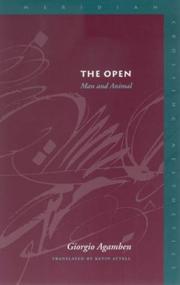
ISBN: 0804767068 1417556900 9781417556908 9780804767064 0804747377 9780804747370 0804747385 9780804747387 Year: 2004 Publisher: Stanford, Calif. Stanford University Press
Abstract | Keywords | Export | Availability | Bookmark
 Loading...
Loading...Choose an application
- Reference Manager
- EndNote
- RefWorks (Direct export to RefWorks)
The end of human history is an event that has been foreseen or announced by both messianics and dialecticians. But who is the protagonist of that history that is coming—or has come—to a close? What is man? How did he come on the scene? And how has he maintained his privileged place as the master of, or first among, the animals? In The Open, contemporary Italian philosopher Giorgio Agamben considers the ways in which the "human" has been thought of as either a distinct and superior type of animal, or a kind of being that is essentially different from animal altogether. In an argument that ranges from ancient Greek, Christian, and Jewish texts to twentieth-century thinkers such as Heidegger, Benjamin, and Kojève, Agamben examines the ways in which the distinction between man and animal has been manufactured by the logical presuppositions of Western thought, and he investigates the profound implications that the man/animal distinction has had for disciplines as seemingly disparate as philosophy, law, anthropology, medicine, and politics.
Philosophical anthropology. --- Human beings --- Animal nature of human beings --- Philosophical anthropology --- Anthropology, Philosophical --- Man (Philosophy) --- Civilization --- Life --- Ontology --- Humanism --- Persons --- Philosophy of mind --- Animal nature. --- Philosophy
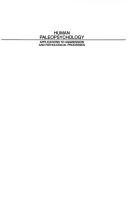
ISBN: 0898598109 Year: 1987 Publisher: Hillsdale (NJ) Erlbaum
Abstract | Keywords | Export | Availability | Bookmark
 Loading...
Loading...Choose an application
- Reference Manager
- EndNote
- RefWorks (Direct export to RefWorks)
Evolutionary psychology. --- Human beings --- Behavior. --- Human Development. --- Phylogeny. --- Psychology. --- Regression (Psychology) --- Animal nature. --- Regression (Psychology).
Book
ISSN: 07682395 ISBN: 2718606932 9782718606934 Year: 2011 Publisher: Paris: Galilée,
Abstract | Keywords | Export | Availability | Bookmark
 Loading...
Loading...Choose an application
- Reference Manager
- EndNote
- RefWorks (Direct export to RefWorks)
Souvent je me demande, moi, pour voir, qui je suis - et qui je suis au moment où, surpris nu, en silence, par le regard d'un animal, par exemple les yeux d'un chat, j'ai du mal, oui, du mal à surmonter une gêne. Pourquoi ce mal ? J'ai du mal à réprimer un mouvement de pudeur. Du mal à faire taire en moi une protestation contre l'indécence. Contre la malséance qu'il peut y avoir à se trouver nu, le sexe exposé, à poil devant un chat qui vous regarde sans bouger, juste pour voir. Malséance de tel animal nu devant l'autre animal, dès lors, on dirait une sorte d'animalséance l'expérience originale, une et incomparable de cette malséance qu'il y aurait à paraître nu en vérité, devant le regard insistant de l'animal, un regard bienveillant ou sans pitié, étonné ou reconnaissant. Un regard de voyant, de visionnaire ou d'aveugle extra-lucide. C'est comme si j'avais honte, alors, nu devant le chat, mais aussi honte d'avoir honte. Réflexion de la honte, miroir d'une honte honteuse d'elle-même, d'une honte à la fois spéculaire, injustifiable et inavouable. Au centre optique d'une telle réflexion se trouverait la chose - et à mes yeux le foyer de cette expérience incomparable qu'on appelle la nudité. Et dont on croit qu'elle est le propre de l'homme, c'est-à-dire étrangère aux animaux, nus qu'ils sont, pense-t-on alors, sans la moindre conscience de l'être. Honte de quoi et nu devant qui ? Pourquoi se laisser envahir de honte ? Et pourquoi cette honte qui rougit d'avoir honte ? Devant le chat qui me regarde nu, aurais-je honte comme une bête qui n'a plus le sens de sa nudité ? Ou au contraire honte comme un homme qui garde le sens de la nudité ? Qui suis-je alors ? Qui est-ce que je suis ? A qui le demander sinon à l'autre ? Et peut-être au chat lui-même ?
Animals (Philosophy) --- Human beings --- Animal nature --- French philosophy --- 20th-21st centuries --- Animal nature of human beings --- Philosophical anthropology --- Philosophy --- Metaphysics --- Animal. --- Animalité. --- Animals (Philosophy). --- Animaux (Philosophie). --- Conscience. --- Djur --- Homme --- Homme. --- Honte. --- Nudité. --- Philosophie. --- Teori, filosofi. --- Animal nature. --- Human beings - Animal nature --- Acqui 2006
Book
ISBN: 1536183733 9781536183733 9781536189384 Year: 2021 Publisher: New York
Abstract | Keywords | Export | Availability | Bookmark
 Loading...
Loading...Choose an application
- Reference Manager
- EndNote
- RefWorks (Direct export to RefWorks)
"While creativity and solidarity form the main constructive profile for our species, the primal animal drive for dominance involving basal brain circuits places our future at risk. This bipolar nature distorts the global perspective of our collective future and ecological conditions. Our species' behavioral construction has its roots in ancestral habits and survival drives that were crystallized in basic neurobehavioral circuits over a millennia, be it as predators or potential prey. Its expression aquired further complexity through the development of social/cultural cues, and was kept-in-check by conditional inhibitory processes. How much of our current drive - individually and as a global community - is caused by those inherited traits imprinted in our animal condition? This book analyses the increasing bipolar construction in terms of dominant groups affecting critical access to current knowledge and information, a profound gap among populations concerning a modern humane quality of life, and present trends pertaining to our ecological habitat"--
Human behavior --- Human beings --- Human evolution --- Evolution. --- Animal nature. --- Social aspects.
Book
ISBN: 0801458927 9780801458927 0801447860 0801475155 9780801447860 9780801475153 0801457688 9780801457685 Year: 2009 Publisher: Ithaca Cornell University Press
Abstract | Keywords | Export | Availability | Bookmark
 Loading...
Loading...Choose an application
- Reference Manager
- EndNote
- RefWorks (Direct export to RefWorks)
Dominick LaCapra's History and Its Limits articulates the relations among intellectual history, cultural history, and critical theory, examining the recent rise of "Practice Theory" and probing the limitations of prevalent forms of humanism. LaCapra focuses on the problem of understanding extreme cases, specifically events and experiences involving violence and victimization. He asks how historians treat and are simultaneously implicated in the traumatic processes they attempt to represent. In addressing these questions, he also investigates violence's impact on various types of writing and establishes a distinctive role for critical theory in the face of an insufficiently discriminating aesthetic of the sublime (often unreflectively amalgamated with the uncanny).In History and Its Limits, LaCapra inquires into the related phenomenon of a turn to the "postsecular," even the messianic or the miraculous, in recent theoretical discussions of extreme events by such prominent figures as Giorgio Agamben, Eric L. Santner, and Slavoj Zizek. In a related vein, he discusses Martin Heidegger's evocative, if not enchanting, understanding of "The Origin of the Work of Art." LaCapra subjects to critical scrutiny the sometimes internally divided way in which violence has been valorized in sacrificial, regenerative, or redemptive terms by a series of important modern intellectuals on both the far right and the far left, including Georges Sorel, the early Walter Benjamin, Georges Bataille, Frantz Fanon, and Ernst Jünger.Violence and victimization are prominent in the relation between the human and the animal. LaCapra questions prevalent anthropocentrism (evident even in theorists of the "posthuman") and the long-standing quest for a decisive criterion separating or dividing the human from the animal. LaCapra regards this attempt to fix the difference as misguided and potentially dangerous because it renders insufficiently problematic the manner in which humans treat other animals and interact with the environment.In raising the issue of desirable transformations in modernity, History and Its Limits examines the legitimacy of normative limits necessary for life in common and explores the disconcerting role of transgressive initiatives beyond limits (including limits blocking the recognition that humans are themselves animals).
Violence --- Animals (Philosophy) --- Human beings --- Intellectual life --- Historiography. --- Philosophy --- Animal nature of human beings --- Philosophical anthropology --- Intellectual history --- Historical criticism --- History --- Authorship --- Philosophy. --- Animal nature. --- History. --- Criticism --- Historiography --- violence and victimization, anthropocentrism, Practice Theory, violences effect on history.
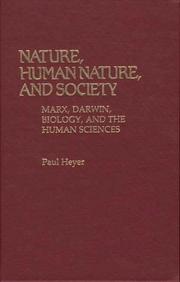
ISBN: 0313231613 Year: 1982 Publisher: Westport (Conn.) : Greenwood press,
Abstract | Keywords | Export | Availability | Bookmark
 Loading...
Loading...Choose an application
- Reference Manager
- EndNote
- RefWorks (Direct export to RefWorks)
Anthropology --- -Social evolution --- Human beings --- -Homo sapiens --- Human race --- Humanity (Human beings) --- Humankind --- Humans --- Man --- Mankind --- People --- Hominids --- Persons --- Cultural evolution --- Cultural transformation --- Culture, Evolution of --- Culture --- Evolution --- Social change --- Philosophy --- Animal nature --- Darwin, Charles --- Marx, Karl. --- Social evolution. --- Philosophy. --- Animal nature. --- -Philosophy --- Marx, Karl --- -Cultural evolution --- Homo sapiens --- Social evolution --- Animal nature of human beings --- Philosophical anthropology --- Darwin, Charles, --- Marx, Karl, --- Darwin, Charles, Robert
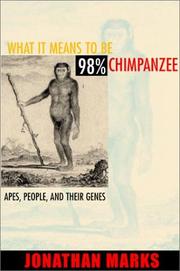
ISBN: 1282357360 9786612357367 0520930762 9780520930766 9780520925953 0520925955 9780520226159 0520226151 1597349984 9781597349987 0520240642 9780520240643 9781282357365 6612357363 Year: 2002 Publisher: Berkeley University of California Press
Abstract | Keywords | Export | Availability | Bookmark
 Loading...
Loading...Choose an application
- Reference Manager
- EndNote
- RefWorks (Direct export to RefWorks)
Marks presents the field of molecular anthropology-a synthesis of the holistic approach of anthropology with the reductive approach of molecular genetics-as a way of improving our understanding of the science of human evolution. This iconoclastic, witty, and extremely readable book illuminates the deep background of our place in nature and asks us to think critically about what science is, and what passes for it, in modern society.
Human beings --- Human genetics. --- Human molecular genetics. --- Human evolution. --- Evolution (Biology) --- Physical anthropology --- Evolutionary psychology --- Human genetics --- Molecular genetics --- Genetics --- Heredity, Human --- Human biology --- Animal nature of human beings --- Philosophical anthropology --- Animal nature. --- Origin --- adaptation. --- anthropology. --- behavioral genetics. --- biological anthropology. --- biology. --- christianity. --- dna. --- ethology. --- evolution. --- folk heredity. --- genes. --- genetics. --- history. --- human animal. --- human evolution. --- human nature. --- law of independent assortment. --- law of segregation. --- life sciences. --- mammals. --- mendel. --- molecular anthropology. --- molecular genetics. --- natural history. --- nature nurture. --- nonfiction. --- population differences. --- primate. --- primatology. --- psychology. --- race. --- racial categories. --- religion. --- science. --- social science. --- sociology. --- zoology.
| Listing 1 - 10 of 13 | << page >> |
Sort by
|

 Search
Search Feedback
Feedback About UniCat
About UniCat  Help
Help News
News